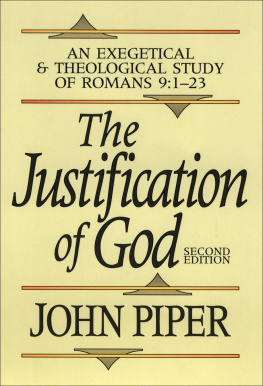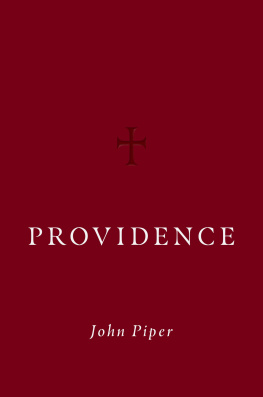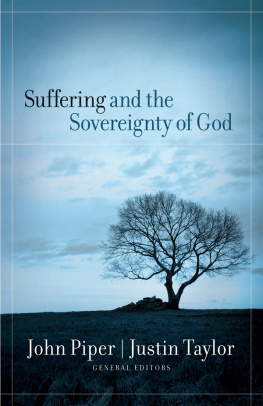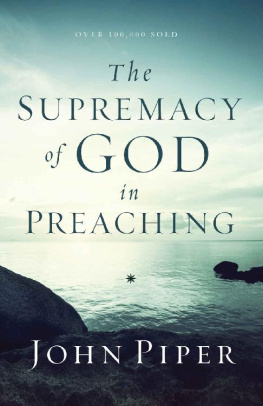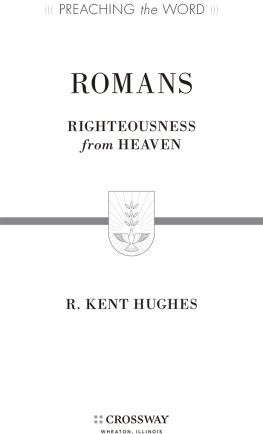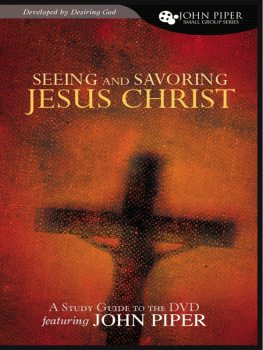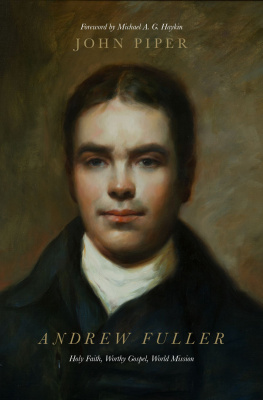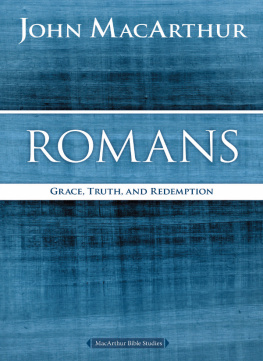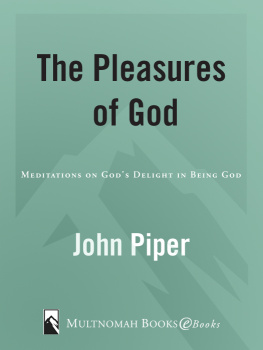Other books by the author
Desiring God: Meditations of a Christian Hedonist (Multnomah Press)
Let the Nations Be Glad! The Supremacy of God in Missions
Love Your Enemies: Jesus Love Command in the Synoptic Gospels and Early Christian Paraenesis
The Pleasures of God: Meditations on Gods Delight in Being God (Multnomah Press)
The Supremacy of God in Preaching
Whats the Difference? Manhood and Womanhood Defined According to the Bible (Crossway Books)
Recovering Biblical Manhood and Womanhood: A Response to Evangelical Feminism (edited with Wayne Grudem, Crossway Books)

1993 by John Piper
Published by Baker Academic
a division of Baker Publishing Group
P.O. Box 6287
Grand Rapids, Michigan 49516-6287
www.bakeracademic.com
Ebook edition created 2012
Ebook corrections 02.17.2015
All rights reserved. No part of this publication may be reproduced, stored in a retrieval system, or transmitted in any form or by any meanselectronic, mechanical, photocopy, recording, or any otherwithout the prior written permission of the publisher. The only exception is brief quotations in printed reviews.
Library of Congress Cataloging-in-Publication Data is on file at the Library of Congress, Washington, DC.
ISBN 978-1-5855-8158-0
To Daniel Payton Fuller, priceless friend
Contents
Preface
Ten years have passed since I wrote the first Preface to this book. During that time I have devoted myself mainly to preaching to one congregation, Bethlehem Baptist Church. The book was written in the context of rigorous academic discipline as I was teaching Biblical Studies at Bethel College, St. Paul. But now for over ten years the thesis has been lived and preached and loved in the context of day-to-day ministry in downtown Minneapolis.
Nothing I have read in the reviews and nothing I have experienced in the ministry has convinced me that the exegesis or conclusion of this book is false. On the contrary, further reflection and experience have sent the roots of Gods sovereignty deeper than ever into my soul and my ministry and the life of our congregation.
Our common theme in worship is the infinite worth of God and his purpose to make known the riches of his glory for the vessels of mercy (Rom 9:23). Our confidence in evangelism comes from Gods freedom to have mercy on whomever he wills (Rom 9:18). Our commitment to world missions is fueled by the passion of God to exert his sovereign power so that [his] name may be proclaimed in all the earth (Rom 9:17). And the ground of our conviction that God is reliable in all of life is this: No matter what heart-wrenching perplexities we face, it is not as though the word of God has failed (Rom 9:6).
There is a great advantage to writing a new preface after ten years. I am able to give at least a partial answer to the question: What sort of theology and what spirit of ministry would grow out of such an exegesis of Rom 9? Not that this settles the question of truth. But often such practical questions linger as the final obstacle when argumentation has done all it can do.
The answer I have given is found in the ministry of our church and in four books: Desiring God (Multnomah Press, 1986), The Pleasures of God (Multnomah Press, 1991), The Supremacy of God in Preaching (Baker Book House, 1990) and Let the Nations Be Glad: The Supremacy of God in Missions (Baker Book House, 1993). These books are the unfolding of the vision of Gods sovereignty in Rom 9 for theology, life and ministry. For any who wonders what the fruit of The Justification of God tastes like, I would direct them to these books and invite them to Bethlehem.
In the process of preparing the book for its new edition, Steve Griffith has earned my respect and gratitude for his labor of love. He took the initiative to push the book back into circulation and he took on the difficult task of reformatting a document laden with Greek and Hebrew.
Again my friend Carol Steinbach has devoted her eagle editorial eye to making the text as clean and smooth and intelligible as possible. She has also compiled fresh indexes for this second edition. Philemon Yong and Mark Reasoner helped me comb through the Greek and Hebrew, and corrected dozens of typing mistakes I had missed.
My wife Nol continues to stand by me in all the travail and triumphs of parenting four sons and shepherding the flock of God, and publishing the good news of Gods delight in being God. We stand frail, needy and secure on the sovereign freedom of Gods grace.
I exult once more in dedicating the book to Daniel Payton Fuller whose great work Unity of the Bible (Zondervan, 1992) is now published. Almost 25 years ago I was swept into the love and labor of serious, painstaking, exhilarating exegesis by this mans classes in seminary. Everything I have preached or written is owing in great measure to the inspiration and exegetical discipline I absorbed from Daniel Fuller.
My prayer, as the book is released again, is that it might serve the great purpose of God expressed in Rom 9:23, to make known the riches of his glory.
John Piper
June 1993
Abbreviations
| ATD | Altes Testament Deutsch |
| ATR | Anglican Theological Review |
| BDB | Hebrew and English Lexicon of the Old Testament (Brown, Driver, Briggs) |
| BJRL | Bulletin of the John Rylands Library |
| CJT | Canadian Journal of Theology |
| EHAT | Exegetisches Handbuch zum Alten Testament |
| EQ | Evangelical Quarterly |
| ET | English translation |
| ET | Expository Times |
| EvTh | Evangelische Theologie |
| FRLANT | Forschungen zur Religion und Literatur des Alten und Neuen Testaments |
| HAT | Handbuch zum Alten Testament |
| HNT | Handbuch zum Neuen Testament |
| HNTC | Harpers New Testament Commentary |
| HThK | Herders theologischer Kommentar |
| HTR | Harvard Theological Review |
| ICC | International Critical Commentary |
| IDB | Interpreters Dictionary of the Bible |
| Interp | Interpretation |
| JBL | Journal of Biblical Literature |
| JTS | Journal of Theological Studies |
| LXX | Septuagint |
| MK | Meyers Kommentar |
| MNTC | Moffatt New Testament Commentary |
| MT | Masoretic text |
| NASB | New American Standard Bible |
| NIC | New International Commentary |
| NIGTC | New International Greek Testament Commentary |
| NT | New Testament |
| NTD | Neues Testament Deutsch |
| NTS | New Testament Studies |
| OT | Old Testament |
| RB | Revue Biblique |
| RevExp | Review and Expositor |
| RGG | Die Religion in Geschichte und Gegenwart, 3rd ed. |
| RSV | Revised Standard Version |
| SBT | Studia Biblica et Theologica |
| SJT | Scottish Journal of Theology |
| SNTS | Society for New Testament Studies |
| StTh | Studia Theologica |
| TDNT | Theological Dictionary of the New Testament |
| THAT | Theologisches Handwoerterbuch zum Alten Testament |
| TheolBeit | Theologische Beitraege |
| ThQ | |
Next page
